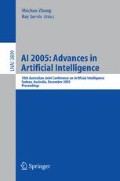Abstract
Moving towards automated service selection, contract negotiation, and contract fulfillment remains a promising vision for E-commerce systems. Trust is one of the main reasons why this vision is not put into practice in current E-commerce systems. Various theoretical models and technical concepts are in place to facilitate crucial factors such as system interoperability or communication-level security. However, proven models, to measure social values such as trustworthiness, reputation or credibility of service consumers and service providers in loosely coupled, distributed E-commerce systems, are the missing factors which prevent the adoption of automated service interaction. This paper demonstrates the application of our Fuzzy trust model in an E-commerce platform. We apply an exemplary business scenario to demonstrate the usage of our Fuzzy trust model.
Access this chapter
Tax calculation will be finalised at checkout
Purchases are for personal use only
Preview
Unable to display preview. Download preview PDF.
References
Del Acebo, E., de la Rosa, J.: A Fuzzy System Based Approach to Social Modeling in Multi-Agent Systems. In: Proceedings of the first international joint conference on Autonomous agents and multiagent systems, Bologna Italy (2002)
Berthold, M.R., Hand, D.J.: Intelligent Data Analysis. In: Fuzzy Logic, ch. 9, pp. 321–350. Springer, Berlin (2003)
Zadeh, L.A.: Fuzzy logic, neural networks, and soft computing. Communications of the ACM archive 37(3), 77–84 (1994)
Schmidt, S., Steele, R., Dillon, T., Chang, E.: Building a Fuzzy Trust Network in Unsupervised Multi-Agent Environments. In: Invited paper to the special session on Trust, Agia Napa, Cyprus (2005)
Castelfranchi, C., Falcone, R., Pezzulo, G.: Trust in Information Sources as a Source for Trust: A Fuzzy Approach. In: Proceedings of the second international joint conference on Autonomous agents and multiagent systems, Melbourne Australia (2003)
Yang, S., Hsieh, J., Lan, B., Chung, J.: Composition and evaluation of trustworthy Web Services. In: EEE 2005 international workshop on Business services networks, Hong Kong (2005)
Sabater, J., Sierra, C.: Reputation and Social Network Analysis in Multi-Agent Systems. In: Proceedings of the first international joint conference on Autonomous agents and multiagent systems, Bologna Italy (2002)
Chang, E., Dillon, T., Hussain, F.K.: Trust and Reputation for Service-oriented Environments. John Wiley & Sons, Chichester (2005) ISBN: 0-470-01547-0
Hussain, F.K., Chang, E., Dillon, T.: Trustworthiness and CCCI Metrics for Assigning Trustworthiness in P2P Communication. Intl. J. Computer Systems Science and Eng. 19(4), 95–112 (2004)
Patrick, A.S.: Building trustworthy software agents, in Internet Computing. IEEE 6(6), 46–53 (2002)
Huhns, M.N., Buell, D.A.: Trusted autonomy, in Internet Computing. IEEE 6(3), 92–95 (2002)
Sycara, K.: Multi-agent Infrastructure, agent discovery, middle agents for Web services and interoperation Multi-agents systems and applications, pp. 17–49. Springer, New York (2001)
Kollingbaum, M.J., Norman, T.J.: Supervised interaction: creating a web of trust for contracting agents in electronic environments. In: Proceedings of the first international joint conference on Autonomous agents and multiagent systems: part 1, Bologna, Italy, pp. 272–279 (2002)
Wang, Y., Vassileva, J.: Bayesian Network-Based Trust Model. In: Proceedings of the IEEE/WIC International Conference on Web Intelligence, WI 2003 (2003)
Resnick, P., Zeckhauser, R.: Trust Among Strangers in Internet Transactions: Empirical Analysis of eBay’s Reputation System. The Economics of the Internet and E-Commerce. Advances in Applied Microeconomics 11 (2002)
The MathWorks, Fuzzy Logic Toolbox for Mathlab Documentation, Available at, http://www.mathworks.com/access/helpdesk/help/toolbox/fuzzy/ (Accessed September 16, 2004)
Author information
Authors and Affiliations
Editor information
Editors and Affiliations
Rights and permissions
Copyright information
© 2005 Springer-Verlag Berlin Heidelberg
About this paper
Cite this paper
Schmidt, S., Steele, R., Dillon, T., Chang, E. (2005). Applying a Fuzzy Trust Model to E-Commerce Systems. In: Zhang, S., Jarvis, R. (eds) AI 2005: Advances in Artificial Intelligence. AI 2005. Lecture Notes in Computer Science(), vol 3809. Springer, Berlin, Heidelberg. https://doi.org/10.1007/11589990_34
Download citation
DOI: https://doi.org/10.1007/11589990_34
Publisher Name: Springer, Berlin, Heidelberg
Print ISBN: 978-3-540-30462-3
Online ISBN: 978-3-540-31652-7
eBook Packages: Computer ScienceComputer Science (R0)

